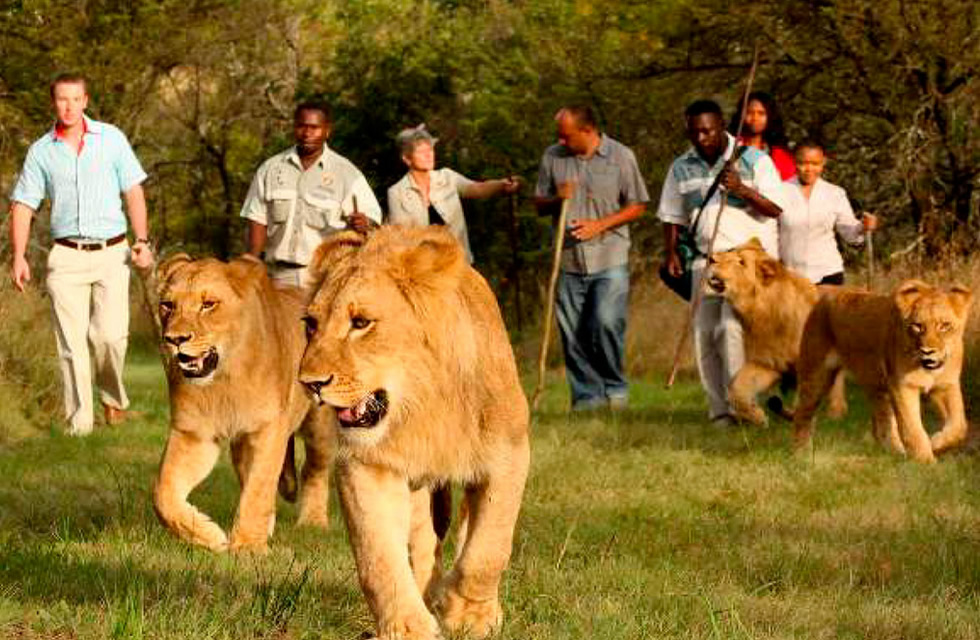Walking With Lions
When my wife, Myung, and I arrived in Zimbabwe in 2009 to begin my three-year tour as U.S. Ambassador there, one of the things I resolved to do was experience all the sights and sites the country has to offer, but primarily, to get photos of the amazing assortment of wildlife.
Over the ensuing three years, until we left in the summer of 2012, we visited most of the parks and game preserves, from Hwange in the northwest to the lower veld in the southeast to Mana Pools in the northeast along the border with Zambia. The most amazing experience, though, was nearer the center of the country in a place with a most unlikely name – Antelope Park.
On our way back from donating books to a school in the central town of Gweru, we decided to spend a couple nights at Antelope Park, billed as Zimbabwe’s most popular and stunning tourist destination after Victoria Falls. Upon arrival, I had to admit that it was a beautiful place; broad savanna with streams meandering throughout, and a profusion of birds and monkeys roaming about the resort and campsites. The first evening, which was capped off with a traditional Zimbabwean barbecue (called a brai) on the edge of the small lake in the center of the resort, saw a ratcheting up in the excitement as we listened to the roar of the prides of lions that roam the park – we were truly in the African bush.
Antelope Park is primarily a game preserve and research facility, housing African Lion Environmental Research Trust (ALERT), a private trust devoted to preserving this majestic species, and educating local communities on how to co-exist with animals. But, it also offers a range of accommodations to tourists, from rough tents to well-appointed thatched roof lodges on the lake shore. Visitors can go on game walks through the bush, or game rides on elephant or horseback, but the offer they made on our second day there is why most people visit the place; we were asked if we’d like to walk with lions.
Now, I grew up in the countryside of East Texas, and I have a healthy respect for wild animals, so it took my wife a while to convince me to agree to do this. It turned out, we weren’t walking with fully grown cats, but with a couple of immature females, one 12 months old, and one 16 months old. Mere teenagers, but, knowing how unpredictable human teens can be, that didn’t really reassure me all that much. When the 16-month-old brushed against my leg when she came out of her cage, and it felt like I was being pushed by a small horse, my feeling of discomfort increased.
The walk proceeded without incident, however, and the two felines were well-behaved. I got some really great photos of them; with the handlers who stayed close and playing with each other like the adolescents they were. Things were going well until the chief handler asked if we wanted to pet them. Whoa, I thought, you’re kidding right? I don’t pet any animal that has teeth nearly as big around as my wrist. My wife, on the other hand, is a city girl who’d never seen a lion outside a zoo or circus, and she thought the ‘little cats were cute.’ Little cats, my eye; but, she was not to be dissuaded. Pet them she did; while I took my photos from a safe distance.
The lion walk is not just adventure for tourists, though. This is how the young lions are indoctrinated in hunting in preparation for introducing them into a pride. The prides are left to roam the park, learning to hunt and protect their territory. The main objective is to introduce them eventually into the larger game preserves with a more than even chance of survival.
At Antelope Park, in addition to game walks and rides, or walking with lions, visitors can take canoe rides in the river that runs through the park or fish for some of the local varieties of fish, and then have them roasted for a brai that evening.
If you’re planning a visit to Africa, southern Africa, and specifically Zimbabwe, should be on your itinerary. Despite its reputation for political instability, the country is safe and the tourist facilities are being improved and brought back to the standards that existed in the early 1980s.
